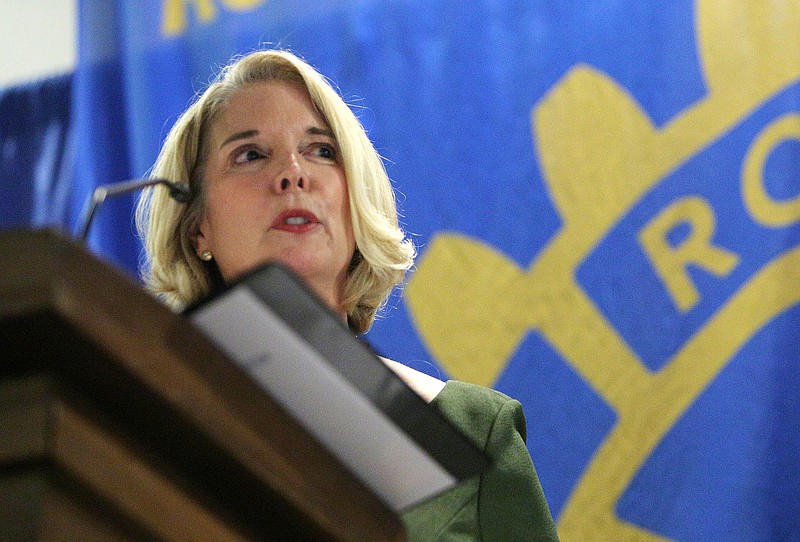NASHVILLE - Beginning next fall, new graduates of the Tennessee College of Applied Technology or similar technical programs offering certificates and degrees from state community colleges will come with an eye-catching "warranty" for prospective employers.
If companies can demonstrate the graduates they hire aren't up to snuff, "we'll take them back and train them for free," Tennessee Board of Regents Chancellor Flora Tydings told Gov. Bill Haslam on Tuesday.
Replied Haslam: "I love the idea. ... That's accountability at its finest."
Tydings described the initiative during higher education officials' budget presentation to Haslam and other officials.
"It's exactly what it sounds like," Tydings, former Chattanooga State Community College president, told reporters. "If you do not have the skill sets for which we say we have trained you, we'll take you back and retrain you for free - if an employer documents that you do not have those skill sets within a year of graduation."
But Tydings said she doesn't expect community colleges and TCAT to have to do much graduate retraining because of the jobs the institutions do.
But the Board of Regents will stand behind its free commitment if there are demonstrable problems, she added.
Holding student tuition/fees to 3 percent or less?
Meanwhile, Tennessee Higher Education Commission Executive Director Mike Krause told the governor he is asking the THEC board to approve holding tuition and fee increases between 0 and 3 percent during the 2018-2019 academic year for the University of Tennessee System, the Board of Regents and six independently governed public universities.
Haslam has made it a priority in the last three years to boost state spending for higher education, reversing a decades-long trend in Tennessee and most states where public higher education has been forced to rely on large tuition and fee increases to make up higher operational costs.
This year, the UT system is seeking a total of $25.94 million in general government dollars for its campuses, which include the University of Tennessee at Chattanooga. The Board of Regents is asking for $23.84 million, while the locally governed six universities, including Tennessee Tech, are seeking $24.49 million.
The total higher ed request is $102.51 million, which includes various state-administered programs.
Haslam isn't ready to say right now whether he will fund the full increase, because he has to balance various state needs ranging from requested increases in K-12 education and teacher pay to TennCare and state workers' salaries.
He cautioned during Monday's hearing that while the state enjoyed the benefits of a $1 billion surplus in putting together the current budget, he expects additional revenues for the budget he will recommend to lawmakers next year to be in the $400 million range.
Tennessee Promise program: 56 percent success rate
Tydings also told the governor that one of his signature achievements, the "Tennessee Promise" program that offers last-dollar, lottery-funded scholarships to state high school graduates attending community colleges and TCAT, is working.
"Right now we have a 56 percent success rate," Tydings said.
She said that means 56 percent of those students have either earned their degrees, transferred to four-year colleges or are "in their fifth term of eligibility and stalking distance of receiving that degree."
The program is part of Haslam's Drive to 55 initiative to boost the percentage of Tennesseans with post-high school training and education to 55 percent of the adult population by 2025.
Tennessee Promise, which has won national recognition, provides volunteer mentors to help students prepare to navigate the college system. Tydings said TCAT and a number of colleges have stepped up their own safety nets for students by boosting faculty advisers' roles and other means.
Non-Promise students have a success rate of 33 percent, Tydings said. However, she emphasized Board of Regents institutions are seeking to provide more support for those students.
Contact staff writer Andy Sher at asher@timesfreepress.com or 615-255-0550. Follow him on Twitter @AndySher1.
